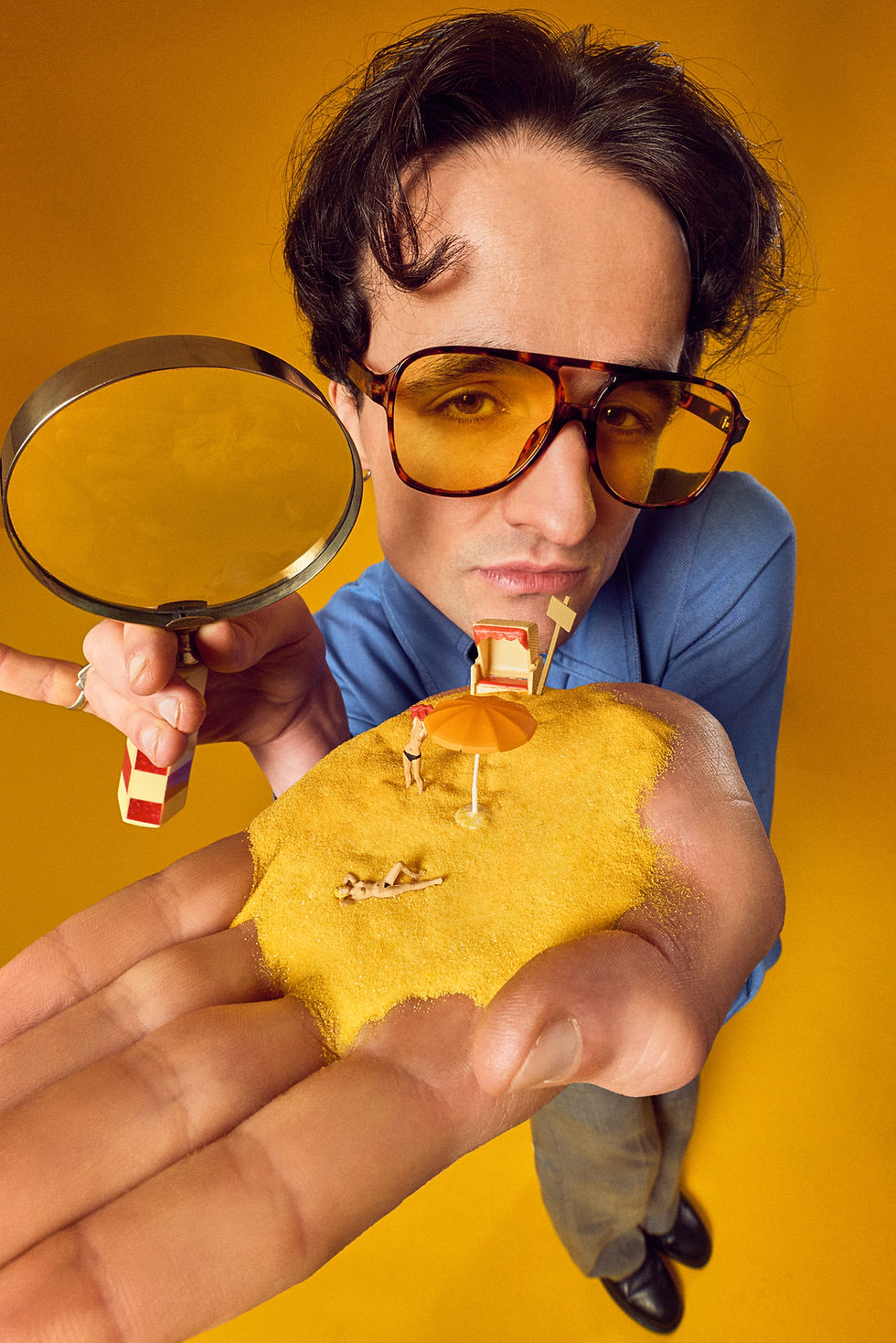Jazz Emu at Edinburgh Fringe: Masculinity, Validation, and the Power of a Ruffly Cape
- Cultural Dose

- Jul 31, 2025
- 4 min read
With The Pleasure Is All Yours, musical satirist Jazz Emu (the alter ego of Archie Henderson) returns to the Edinburgh Fringe with a show that’s as much an existential crisis as it is a funk-soaked spectacle. Fusing character comedy, synthpop swagger, and cultural critique, Henderson’s latest outing dives beneath the glittery surface of self-help culture and masculine bravado.

The Pleasure Is All Yours is your latest solo musical comedy show. What’s the premise, and where does it take Jazz Emu that we haven’t seen before?
The premise of this show is that Jazz Emu, on his 50th show of the week, is used to satisfying the audience to completion in five minutes flat. But this show, he just can’t get them gruntled. There follows a frantic and mad mission to “get them up to his level”. It’s an exploration of power and dominance and male fragility. I wanted to dig into why I love performing as this character, and how the comic tragedy of these big braggadocious male characters fits into the modern conversations about manosphere. I also wanted to wear extremely tight 70s flares and a ruffly cape on stage.
For fans who’ve followed your previous shows and online work, what’s different this time around – in style, theme, or emotional territory?
I hope this show is taking everything I’ve done so far in terms of character and style and genre and using all of these tricks to look at itself and why this thing I’m doing exists. I took a different process to writing this year - previously I’ve just written a whole script front to back from a story idea, and then swapped a few sections and songs in and out that needed punching up. This time round, I started writing as much material as I could around a theme (satisfaction) and then let the shape of the show grow from the bits that emerged. What I’ve ended up with is lightyears away from what I imagined at the start but I think and hope it’s ended up making it a much more coherent show, and a more interesting look at the ideas of fragile masculinity I’m trying to send up.
Jazz Emu has always been a satire of slick self-confidence. How has your understanding of him deepened over the years, and what’s changed in how you embody him on stage?
It’s a really fun feeling as you build an understanding of a comic character to feel like you know more instinctively what he would do in a given situation, and especially when the people you’re working with immediately agree. Sort of starting with this big broad archetype, and digging into the specificity of this version and making choices.
There are questions you need to ask in the building of a slightly evil comedy character that feel quite important: how actually bad is this guy? You still need the audience to root for him. And a lot of that can be got away with in the performance (read: being cheeky), but there are definitely some decisions we’ve had to make over what level of petty crime this loveable villain has historically committed… The funnest thing has been learning how these posturings of confidence are being used by these archetypes to mask their fundamental need to be liked and valued, and growing more attuned to how this plays out in smaller ways in the real world.
In terms of how I play him onstage - I definitely do more hip gyrations than when I started.
The show explores power, performance and the chase for external validation – through the lens of music, comedy and character. What drew you to explore these ideas through Jazz Emu?
Well, Power, Performance and External Validation are three of my favourite things, historically. And I suppose at some point I realised that is pretty laughable. And laughing at myself and the way I interact with these concepts makes all of it feel lighter for me, but more importantly, makes me reach the baseline of Tolerable To Be Around for my friends and family.
You’ve been performing as Jazz for five years now. Creatively and personally, what’s been the biggest shift in how you approach the character – and in how he reflects (or distorts) parts of yourself?
I think at every stage I have pushed myself to try and be more vulnerable with it - unpack my masculine repression and eek a bit more of myself and my fears and hopes into the, which believe me does not come naturally to me. I would’ve happily spent the rest of my life crushing things down. But it’s been much more fun to get into the mental weeds through the mouth of this cartoon character. And let me tell you, some of them are absolutely mental.
What’s next after Edinburgh? Is Jazz Emu an endless evolving project?
I’m working on more ways to get Jazz on screen in a narrative setting. I love stories, and he’s a pretty fun character to churn through a mush of events and disasters to see how he’ll react and change or never change. I love writing the songs too, and will probably do that until I die. But I’m also feeling tempted to write a musical with no Jazz Emu in it, to see if I can, and then realise I can’t, and come back to writing the whitest funk music history ever perceived by history (and I am including Kenny Loggins in that list).
The Pleasure Is All Yours runs at Pleasance Dome (Queen Dome) 30th July -24th August. Tickets available HERE.




Comments